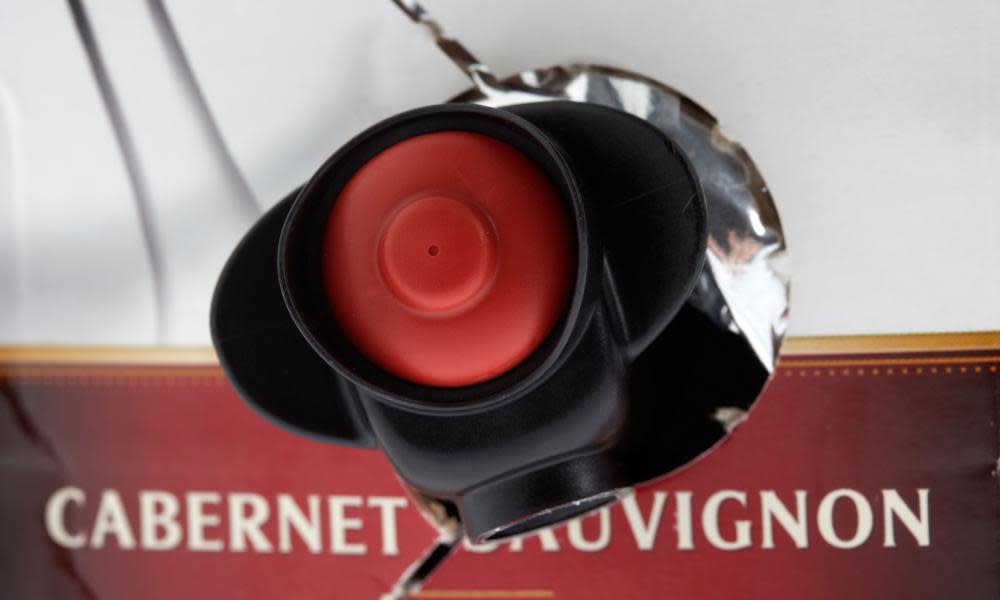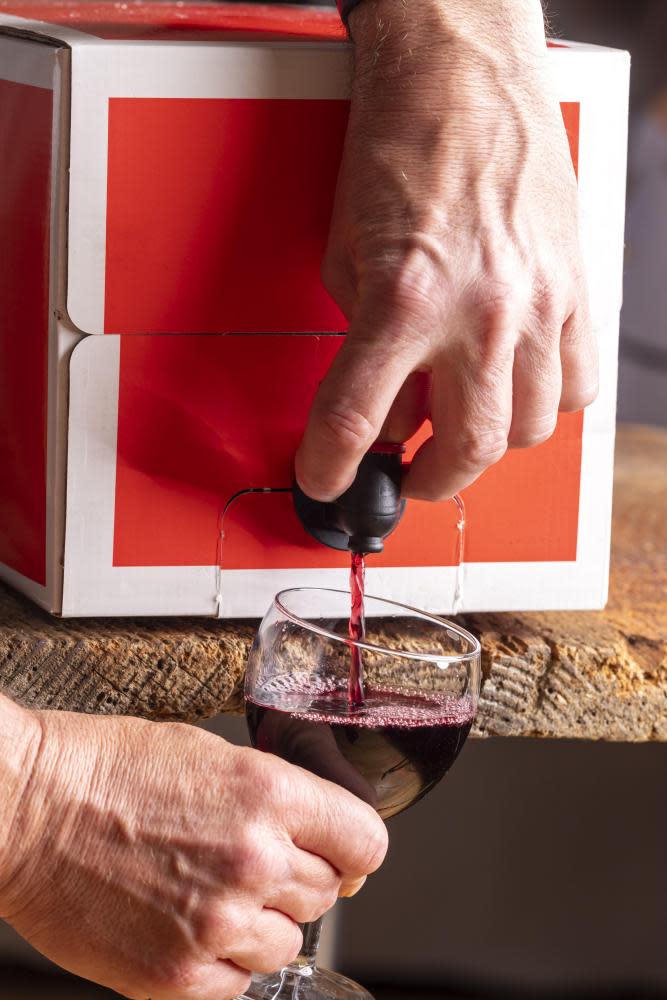Goon as new: cask wine makes a comeback as Australians drink for the times

As the coronavirus pandemic upended Australians’ lives and kept them in their homes, they turned to an old faithful: cask wine.
Boxed wine, perhaps better known as goon – or cardboardeaux – may stir memories of ill-spent teenage years drinking in parks for some. But winemakers who’ve seen a spike in sales say it’s well-suited to an era where people are housebound and couch-prone and money is tight.
“The consumer’s obviously discovering the value that cask wines do offer, and is surprised at the quality of the cask wines,” Darren De Bortoli, managing director of De Bortoli Wines, told Guardian Australia. His company has seen increasing interest in its cask wine products in the last few months, he said.
Related: The Goopification of grapes: why 'clean wine' is a scam
“The feedback we’re getting is that a lot of people are surprised at how good cask wine really is.”
In the four weeks to 5 April 2020, cask wine sales in the Australian retail market jumped by 21%, according to data reviewed by Wine Australia from market researcher IRI Market Edge. Sales had grown by just 1% the previous month, and were in decline before that.
Quality aside, the word that winemakers often use when talking about cask wine is convenience.
The packaging of boxed wine means that very little oxygen enters even once it’s opened, so wine can keep for a week or two.

“If you can’t go and repeat shop, and you’re restricted in terms of how many times you can go and visit a shop, you know you can open a two-litre cask and it’ll last for a week or more,” said Nick Waterman, president of the South Australian Wine Industry Association and managing director at Yalumba.
“What we see is households where there’ll be people in the same house, whether they’re a couple or flatmates, and one likes red and one likes white. It means you can have your preferred variety, and drink it over the space of a number of days and nights,” Waterman said.
Waterman said cask wines were previously in decline by about 5-7% annually but this year’s numbers were looking better.
Winemaker Con-Greg Grigoriou launched a limited edition cask wine in June with his company Delinquente Wine Co, which is based in the same Riverland region where cask wine was first invented. Although the plans were in train before Covid-19 hit, the product was well-suited to the times, he said.
“If you’re in lockdown but you don’t really want to be opening a bottle and having to feel the need to drink that bottle at night or you’re the type of person that only likes one or two drinks it does sort of work really well in that situation,” he said.
De Bortoli said that cask wine lent itself to a more browsing style of drinking, where you can have a couple of glasses with dinner or in front of the TV.
Perhaps cask wine’s greatest allure in tough economic times is its low price point. Its popularity is part of a broader coronavirus-era trend of Australian consumers embracing cheap wines.
Related: A hard cask: can Australia embrace the boxed wine resurgence?
According to the new data, the one-fifth jump in wine sales between mid-March and mid-April was distinctly weighted towards cheap wines. Bottles costing between $6 and $10 were the fastest growing price point, jumping by almost a third, but sales of bottles costing $50 and over fell.
“Obviously with Covid you’ve got people being very careful with their money,” De Bortoli said.
As well, the “on-premise” market – restaurants and other hospitality venues – account for the purchase of many of the more expensive wines, De Bortoli explained. It is now “day to day drinking” driving demand.
But not everyone is sitting at home drinking cask wine. An auction purchase last month broke the record for the highest price ever paid for an Australian bottle of wine: a Melbourne buyer shelled out $103,000 for a bottle of Penfolds Grange.
Fine-wine retailer Langton’s, which ran the auction, says it has seen an increase in customer demand for premium wines since Covid-19 restrictions were put in place, with a 53% increase in sales since March.
Other trends include more online purchasing of wine, according to Leconfield and Richard Hamilton Wines. Dan Murphy’s said it was seeing strong support for local and smaller winemakers as well.
De Bortoli said the industry had seen spurts of panic buying throughout the pandemic as people grew concerned liquor stores would close.
He said total wine consumption appeared to have dropped a little. “It’s not like people are drinking shitloads more alcohol,” he said. “They might be, but I suspect it’s just spirits. If you’re going to get hammered, you’re going to go spirits.”
Even people who are “very much wine aficionados” are getting on the cask wine trend, De Bortoli said.
“Look, I’m a winemaker and I’ve got a cask, I’ll grab an occasional glass,” he said. “I can understand that.”


